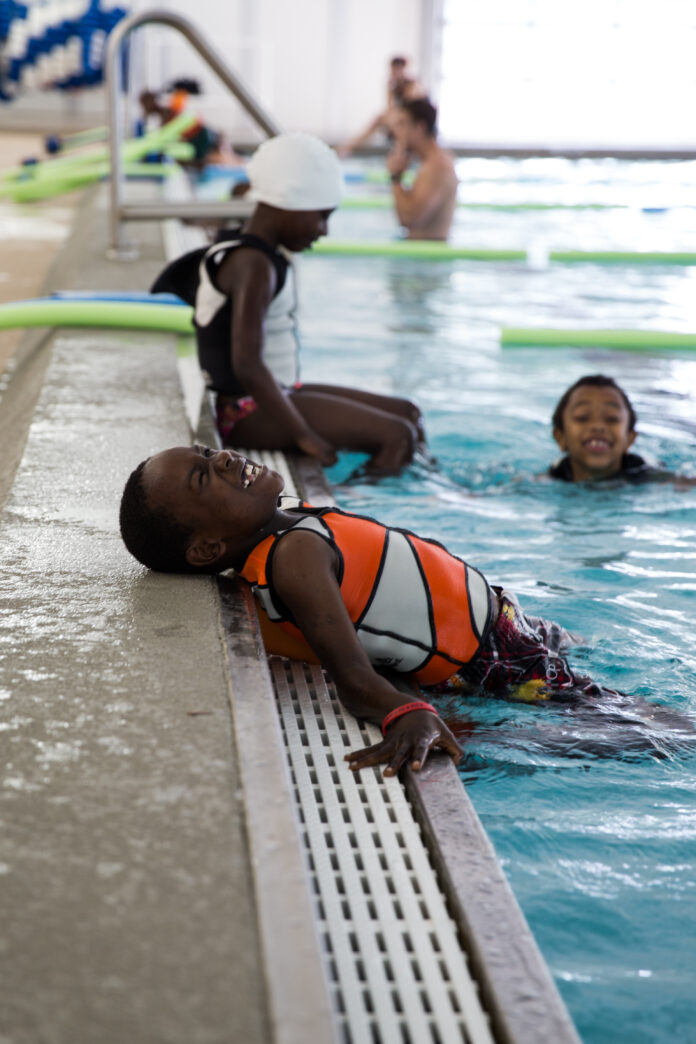Ensuring water safety is crucial for both you and your family, a principle strongly emphasized at MJ Swim Academy.
It’s all about recognizing the potential dangers, knowing your personal limits and never overestimating your abilities. Always remember, never swim alone and use safety aids like life jackets.
Ignoring these basics can put you at significant risk, including drowning and potential legal implications. If you stick around, you’ll get insightful tips on everything from pool rules to emergency procedures for different water environments.
Key Principles of Water Safety
Building on your understanding of water’s unpredictable nature and the potential dangers, let’s now explore some key principles that can guide you to be safer around water.
Firstly, never overestimate your abilities. Regardless of how strong a swimmer you are, currents and tides can be stronger. Always respect water’s power. Additionally, never swim alone. It’s crucial to have a buddy who can provide help if needed.
Moreover, be aware of your surroundings. Know the water’s depth, temperature, and current before diving in.
Another principle is recognizing the importance of life jackets. Don’t just have them on board, but wear them.
Most drownings occur because people underestimate the need for personal flotation devices. It’s also important to learn and practice lifesaving skills. Knowing CPR and first aid can make a significant difference in an emergency.
Risks of Ignoring Water Safety
Ignoring water safety measures can put you at significant risk, leading to dangerous situations or even tragic outcomes. If you’re not cautious, water-related accidents can happen quickly and often without warning.
Drowning is a real and immediate danger when you disregard safety protocols near water bodies. It’s the fifth leading cause of unintentional injury death in the United States, and it can occur in as little as a few inches of water.
Ignoring water safety isn’t just about the physical risks, but also the legal implications. If you own a pool and don’t follow safety regulations, you could be held liable for any injuries or deaths that occur.
Water safety is also important when boating. Ignoring safety measures on a boat can lead to capsizing, collisions, or falling overboard. Proper use of life jackets, understanding boating rules, and weather awareness are essential.
Neglecting water safety while participating in water sports can lead to serious injuries, including head trauma, spinal injuries, and even death. You’re also at risk of hypothermia if you’re in cold water for too long without proper protection.
Water Safety Tips for Swimming Pools
When swimming in a pool, always prioritize safety to prevent accidents and guarantee a fun, enjoyable experience. Here are some important tips to keep you safe.
First, you must learn to swim. If you can’t swim, don’t panic. There are plenty of swimming lessons available for all ages and abilities. Make sure you’re comfortable in the water before you plunge in.
Next, never swim alone. Always make certain you have a buddy with you. This is a vital tip, as they can help if you run into trouble.
Moreover, follow all pool rules. They’re there for your safety. Don’t sprint around the pool as the floors can be slippery and cause accidents.
Also, don’t leap into shallow water. This can lead to serious injuries. Always check the pool’s depth before plunging.
Lastly, keep an eye on the weather. If you see or hear a storm approaching, get out of the pool immediately. Lightning strikes can occur and they’re deadly.
Essential Beach Safety Guidelines
Just like swimming in a pool, there are important safety guidelines you should follow at the beach to guarantee a safe and enjoyable experience.
First and foremost, don’t swim alone. It’s always safer to swim with a buddy. This way, if anything goes wrong, there’s someone to help or call for assistance.
Secondly, you must stay aware of the current weather conditions and forecasts. Storms can suddenly materialize and cause dangerous waves and currents. It’s essential to stay vigilant and leave the water at the first sign of bad weather.
Next, you should only swim in designated areas supervised by lifeguards. These areas are marked for a reason. Lifeguards are trained to spot and handle potential dangers, and they’re your best bet for a safe swim.
Also, beware of rip currents. They’re powerful, fast-moving channels of water that can pull you out to sea. If you’re caught in one, don’t fight it. Swim parallel to the shore until you’re out of the current, then swim back to the beach.
Lastly, always protect your skin. Apply sunscreen and wear protective clothing to guard against harmful UV rays. Following these tips will help ensure your beach day is safe and fun.
Water Safety Considerations for Children
Keeping children safe in and around water involves a specific set of precautions you need to take into account. First and foremost, never leave your kids unattended near water. It’s not enough to be in the vicinity; you must keep a watchful eye at all times.
Enroll your children in swimming lessons. Equipping them with basic swimming skills can help reduce the risk of accidents. However, don’t rely solely on these skills to keep your child safe. Even the best swimmers can get into trouble in the water.
Next, make sure your child understands the dangers of water. Explain why they can’t go near the pool or beach without an adult, and the risks of diving into shallow water. This understanding will help them become more aware and cautious.
Always use safety equipment, such as life jackets, when boating or doing other water activities. Despite their swimming abilities, children should always wear a life jacket to prevent drowning.
Emergency Procedures in Water Accidents
In the event of a water accident, it’s important you know how to respond swiftly and effectively. Time is of the essence. Your first move should be to guarantee your own safety. Never plunge into the water if you’re unsure of the depth or if there are unseen hazards.
Next, call for help. Dial your country’s emergency number immediately. While waiting for professional help, try to aid the victim if it’s safe. If they’re conscious, throw them a flotation device. In case they’re unconscious, only enter the water if you’re a skilled swimmer and there’s no immediate danger.
Once you’ve reached the victim, check their breathing and pulse. If they’re not breathing, start CPR. Remember, your safety also matters. Don’t put yourself in danger.
Lastly, after the rescue, it’s essential to get the victim medical attention, even if they seem fine. Water accidents can lead to secondary drowning or delayed health issues. It’s better to be safe than sorry.
Knowing these emergency procedures could make the difference between life and death. So, take the time to learn them. Water safety is everyone’s responsibility.
Conclusion
So, you’ve seen how important water safety is. It’s not just about swimming pools or beaches, it’s a matter of life and death.
Ignoring it can lead to catastrophic consequences, especially for children. Remember the key principles, follow the safety tips, and know your emergency procedures.
Stay safe, enjoy the water, but always respect its power. Because when it comes to water safety, it’s better to be over-prepared than under.

| [donate]
| Help keep news FREE for our readersSupporting your local community newspaper/online news outlet is crucial now more than ever. If you believe in independent journalism,then consider making a valuable contribution by making a one-time or monthly donation. We operate in rural areas where providing unbiased news can be challenging. |

















